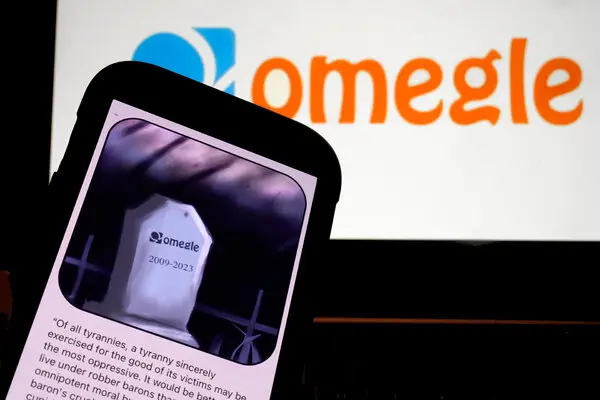
Omegle, a popular website that allowed people to chat, talk and interact with strangers from all over the world, has shut down after 14 years. The website’s owner- Leif K-Brooks, said he made the decision because “stress and expense of operating Omegle, and fighting its misuse – are simply too much.”
Founded in 2009, Omegle was a platform that allowed users to interact with random people on the internet without having to reveal any details about themselves. The anonymous online chat service did not require users to register to chat, which might be one of the reasons why the service gained massive popularity.
The online chat service saw an increase in usage during the COVID-19 pandemic, as many people were stuck in the vicinity of their homes and couldn’t talk or meet with others.

Omegle users could choose if they want to engage with strangers via text, voice or videos. The platform also had an ‘Add your interests’ option where people could narrow down their search to meet people with similar interests.
However, the online chat service often found itself in hot waters, with users often complaining about paedophilia, racism, abuse and sexism. In the last few years, Omegle has also seen a multi-fold rise in child sex abuse and nudity.
While Omegle tried to fix the issue by introducing moderated chat rooms, working with law enforcement agencies and increasing the minimum age limit from 13 to 18 years, the problem was that there was no age verification process and most people engaged in nudity and racism faced no consequences.
Omegle, a chat service that pairs users with a random person so they can talk via text or video, is shutting down. Leif K-Brooks, who launched the service when he was 18 years old, announced its closure and talked about its humble beginnings, as well as how it grew organically because “meeting new people [is] a basic human need.” While he didn’t delve into the specific reasons for Omegle’s shutdown, he admitted that “some people misused [the service], including to commit unspeakably heinous crimes.”
Critics have raised concerns about the website’s safety over the past years, with some even calling it a “magnet for pedophiles.” In 2021, an American woman sued the website for pairing her with a person who coerced her into sending explicit images for three years, starting when she was just 11 years old. Her legal team said that the way the platform works allows it to become a “hunting ground for predators.” Last year, two men in the US were sentenced to federal prison for exploiting children they met on apps, including Omegle, forcing them to perform sexual acts and to send them explicit photos and videos. A BBC investigation also revealed a rise in cases of users exposing themselves on Omegle chat. These users included minors, because while the website is technically meant for use by people 18 and older, it has no age verification in place.
In his farewell note, K-Brooks said he worked with law enforcement agencies, as well as “the National Center for Missing and Exploited Children, to help put evildoers in prison where they belong.” His website, he said proactively collected evidence against these people and tipped authorities to put them in jail. However, he said the fight against crime is “a never-ending battle” and that the “world has become more ornery” in recent years. He also said that there’s been “a constant barrage of attacks on communication services… based on the behavior of a malicious subset of users.”
In the end, he found the “existing stress and expense of operating Omegle, and fighting its misuse” to no longer be sustainable, both financially and psychologically. “Frankly, I don’t want to have a heart attack in my 30s,” he added.






